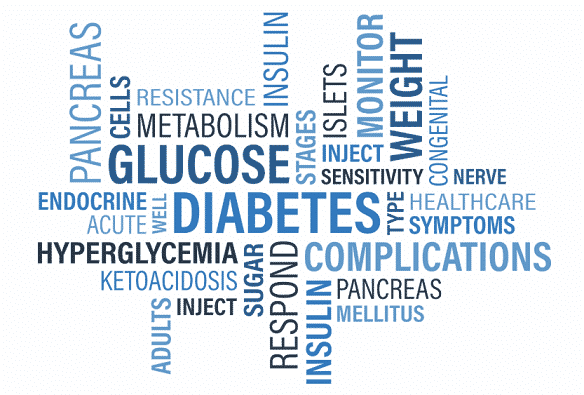DISCLOSURE: This post may contain affiliate links, meaning when you click the links and make a purchase, I receive a commission. As an Amazon Associate I earn from qualifying purchases.
After a quick look at some medical terms, you might want to conclude that they are long, complex words that are understood and can be pronounced by only doctors, nurses, and other members of the health care team. But the truth is, with a little bit of practice anyone can master and understand those seemingly scary words that make up medical terminology.
Whether you’re looking to take up a career within or related to health care, or you’re just passionate about the world of medicine, your first step towards learning and understanding medical terminology is to get yourself a good book on the subject. While the market abounds with books that promise to help you master medical terminology, not all of them are worth your money and time.
To help you make the right buying decision, we compared several medical terminology textbooks in the market and selected the best five among them — based on reviews by real buyers, scope of content, simplicity and beginner-friendliness, price, and other important factors that matter.
And here are our top 5 picks.
1. Medical Terminology: A Living Language
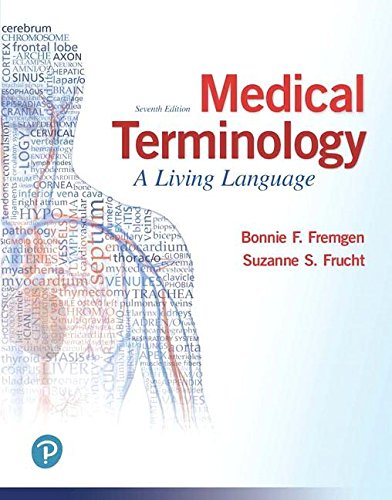
One of the best books on medical terminology (actually the best in our opinion), Medical Terminology: A Living Language is not comprehensive, but very helpful and easy to understand — thanks to the several diagrams and examples that help to relate medical terms to one another.
Each section of the book contains tests and “practice as you go” sessions that test your ability to not only recall medical terms and abbreviations, but also to form new valid medical terms yourself. And the exercises in each chapter are well organized to help you understand the concepts better and faster.
So, if you’re that kind of person who prefers to understand new things rather than cram them, then you’d be impressed by the book because it focuses on teaching you to use word parts to build terms rather than memorize them. The latest edition of the book has been improved to include a comprehensive list of word parts and additional practice problems that enhance your ability to correctly spell, use, and form medical words within the context of basic anatomy and physiology.
Note, however, that this isn’t a “perfect” book — there’s none, really. Some users complained that the book doesn’t go into certain details and has some sections of it poorly organized. But the truth is, no book can meet the expectations of every reader. The fact that majority of the book’s buyers on Amazon left excellent ratings and positive reviews speak volumes!
- Authors: Bonnie F. Fremgen, Suzanne S. Frucht
- Publisher: Pearson
- Current edition: 7th edition (January, 2018)
- Pages: 640
>>> Buy Now or Rent on Amazon.com
2. Medical Terminology: The Best and Most Effective Way to Memorize, Pronounce and Understand Medical Terms
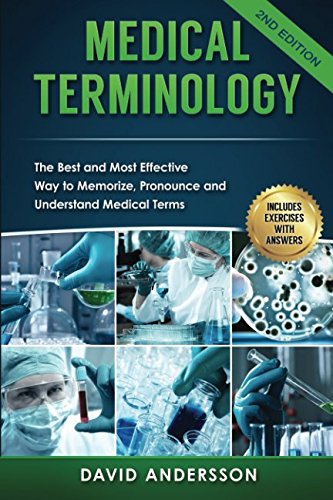
In less than 200 pages, this book packs a great deal of information on how to understand, memorize, and use medical language. It’s a must-have resource for anyone who wants to have that constant feeling of smartness that comes with knowing that you can interpret any medical term.
If you’re the type who doesn’t like to read intimidatingly big books, then you’d prefer this concise option, which has been written for those looking to become doctors, nurses, medical assistants, EMTs, and even medical lawyers. It’s also a great tool for those preparing for the MCAT.
One particularly impressive thing about the book is the way it breaks down medical terms into super easy to understand bits. And to enhance learning, the end of each chapter is marked by a quiz comprising questions that come in different styles. It’s also well organized to help the reader flow seamlessly from one section to the other.
One of the common complaints about the books is that it is “too basic”, which means it over-simplifies everything it focuses on. As one would expect, this complaint came from practsing medical professionals who were only looking to widen their scope, not to learn medical terminology from scratch. So, bear in mind that this book is for beginners who are not familiar with most medical terms.
- Author: David Andersson
- Publisher: Independently published
- Current edition: 2nd edition (November, 2016)
- Pages: 182
>>> Buy Now or Rent on Amazon.com
3. Medical Terminology for Health Professions
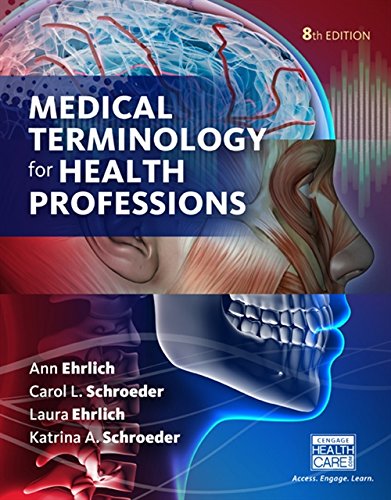
This is one of the bestselling books on medical terminology — and that alone speaks volumes. The book lays emphasis on important parts of each medical term, such as prefixes, suffixes, and root words. This approach helps to simplify the process of memorizing medical terminology, and to lay a solid foundation for learning several terms related to medicine.
The book is organized according to body systems. And each chapter begins with a general overview of the medical terms related to structures in the system under focus and their functions. To be precise, each chapter starts with a list of 60 key terms and 15 essential word parts related to the system. The chapter then moves on diseases and disorders related to that system before wrapping up with relevant diagnostic procedures and treatments.
In addition to helping you to memorize medical terms easily, this book engages effective learning measures aimed at helping you to understand how the human body works, what could go wrong with it, and how diseases are treated. These measures include the addition of real-life medical scenarios and critical thinking exercises in every chapter, and the addition of flashcards to help test your ability to recall medical terms and increase your knowledge and understanding of them.
One downside of the book is that answer keys to the exercises at the end of each chapter are not included. We hope the authors would consider adding them in subsequent editions. Another common complaint is that the book is relatively expensive, but we strongly recommend it nonetheless, as it’s worth every dollar spent to get a copy.
- Authors: Ann Ehrlich, Carol L. Schroeder, Laura Ehrlich, Katrina A. Schroeder
- Publisher: Cengage Learning
- Current edition: 8th edition (January, 2016)
- Pages: 688
>>> Buy Now or Rent on Amazon.com
4. Medical Terminology For Dummies
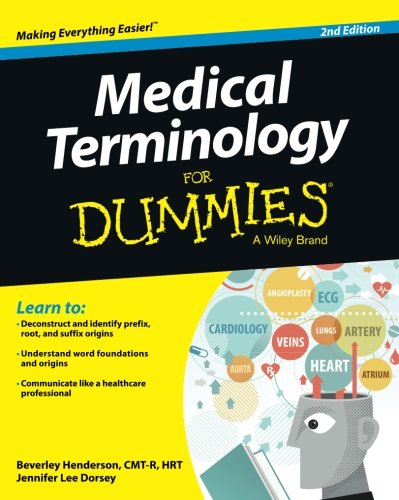
If you’ve read any of the “for dummies” books in the past, then you’d agree that they are written to break down the most difficult concepts and terms into the simplest easy-to-understand basics. And this book, Medical Terminology For Dummies, is no exception.
One interesting upside of this book is that it teaches, in a very friendly and interesting manner, how to easily remember tongue-twisting and unfamiliar medical terms by breaking them down into their basic parts: prefix, root word, and suffix. It also uses mnemonics to help you recall important terms better.
The book doesn’t just familiarize you with medical language, but it also enhances your understanding of the various body systems, how they work, diseases related to them, and management procedures related to them. So, if you want to learn basic anatomy and physiology as you enter the realm of medical terminologies, you won’t go wrong with this book.
- Authors: Beverly Henderson, Jennifer Dorsey
- Publisher: For Dummies
- Current edition: December 2008
- Pages: 384
>>> Buy Now or Rent on Amazon.com
5. Medical Terminology Made Easy
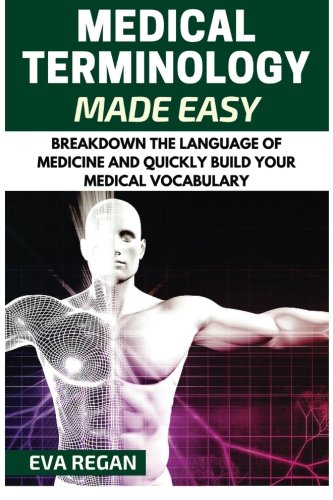
Just as its name implies, Medical Terminology Made Easy, was written to help non-medics and aspiring health care professionals to better understand the logic of medical terminology and apply it correctly.
In less than 150 pages, the book teaches how to build medical terms from scratch using roots words, prefixes, suffixes, and combining forms that have all been well explained. It also teaches how to deconstruct complicated medical terms, use medical terms correctly in communication and documentation, and explain the meaning of medical terms to other people.
From the book, you’ll be able to understand the etymology of medical terms, eponyms, homonyms, and formation of plurals. The book also includes helpful illustrations that make its content easier to read and understand. In short, with this book in your hands, there’s nothing you cannot understand as far as medical language is concerned.
- Authors: Eva Regan
- Publisher: CreateSpace Independent Publishing Platform
- Current edition: First edition (April, 2016)
- Pages: 132
>>> Buy Now or Rent on Amazon.com
Wrap up
With a good understanding of medical terminology, you won’t have to look around for a dictionary or open Google in your browser each time you hear a medical term. And that’s confidence in itself.
With any of the books on our list, you’d be able to learn and master medical terminology and use it correctly.
Related
- 20 Best Books on Mindfulness for Beginners (Meditation & Positive Thinking)
- 20 Best Books on Diabetes Management (Type 1 & 2 – Pre-Diabetes Prevention)
- Best Books on Emergency Medicine (2022 Review)
- 20 Best Books on Meditation For Beginners (Transcendental, Mindfulness & Zen Meditation)
- 20 Best Self Help Books For Depression And Anxiety
- 5 Best Medical Terminology Books for Beginners (2022 Review)
- 5 Best Anatomy Atlases Compared (2022 Review)
